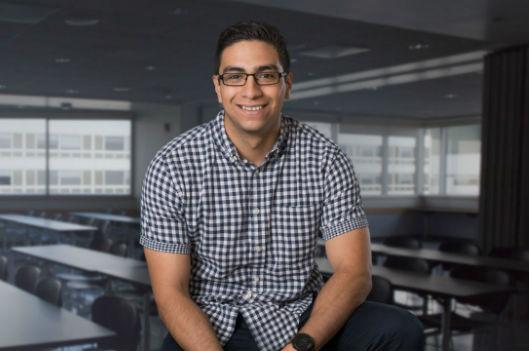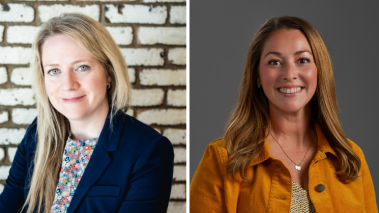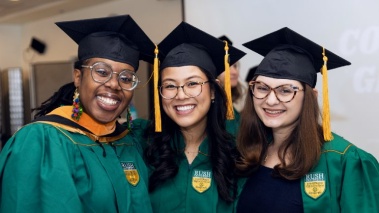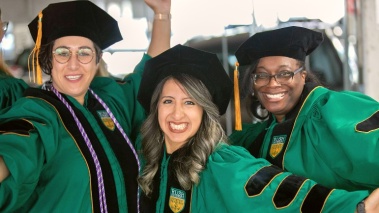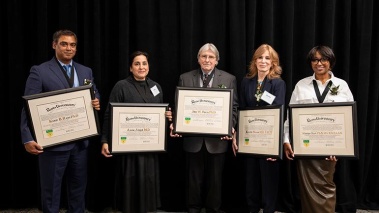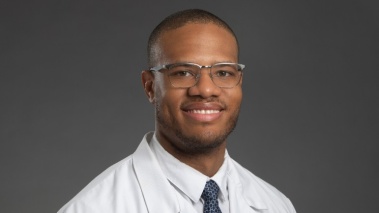A native of Eagle Pass, Texas, young Jesus Gonzalez watched as his migrant farmer father’s backyard crops withered away and died.
He wanted to know why.
And with that simple question, Gonzalez began his journey as a scientist. This journey would lead him to becoming the first person in his family to earn a four-year college degree and the first to pursue an advanced degree. It would lead him right to Rush University, where he is currently a second-year student in the master of science in medical laboratory science program in the College of Health Sciences.
We asked Gonzalez to share with us the experiences that brought him from Eagle Pass, Texas, to Rush University, as well as his insights about the medical laboratory science program.
Describe your early experiences with science and how they impacted you.
Jesus Gonzalez: When I was younger, both my parents were migrant farm workers, traveling outside of Texas during planting and harvest seasons. At home, my father cared for his own crops. One year, most of his crops died. I wanted to understand why that had happened, so I created my own science project.
Most of my dad’s plants had brown spots on them. I wanted to demonstrate how something had spread from one plant to another, eventually killing each plant. To do that, I grew two tomato plants: one I surrounded with the remains of diseased plants; the second, I planted without the diseased remains. In the first one, the brown spots did spread, and I was able to stop the spread of infection by using commercial chemicals.
While I didn’t win the science fair – not even close – from that point on, my interest in bacteria, viruses and disease really peaked.
And that’s why I went to the University of Texas in Austin, where I received my bachelor’s degree in microbiology.
I was the first in my family to graduate from a four-year college, so my parents were incredibly proud. When I told them I wanted to get a master’s degree in medical laboratory science as well, they were ecstatic.
What really appealed to me about medical laboratory science in particular is the fact that I can perform similar kinds of experiments in the lab, ones in which I identify a culprit and help someone out in the process.
How did you find your way to Rush University’s master of science in laboratory science program?
I knew I was done with the Texas heat; it was unbearable. I wanted to find a graduate program somewhere else. When visiting family in Chicago for a football game, I told them about my plan to go to graduate school outside of Texas. They said that Chicago had many wonderful universities. I really liked Chicago, so I began to research them. Rush University, I found, had exactly what I was looking for: a master’s degree program in medical laboratory science. I was really impressed by the program’s statistics, especially the board certification and job placement rates.
What was it about your first year in the program that resonated with you most?
All the classes pertain to identifying what’s wrong with the patient. In hematology, we learn about blood cells and how they’re altered in diseases like leukemia and lymphomas. In microbiology, we learn about the many types of bacteria and what tests evaluate them. And in chemistry, we learn about hormones, enzymes and glucose levels. All of it relates back to our ultimate goal: to find out why a patient is sick.
I especially liked clinical immunohematology, which relates to blood banks and how transfusions can go right … or wrong. I enjoyed that class the most because it was like solving a puzzle, and I love puzzles. We looked at how different blood types work together and what fits. Like a crossword puzzle, you work until you find a perfect match. When you do, it’s pretty gratifying.
I’ve also had the chance to work on research projects. For example, we looked at more cost-effective ways to effectively test for transplant compatibility. I’ve also appreciated the opportunity to work at the Rush Blood Center. In fact, my job assisting with specimen processing really helped with my classwork. Through osmosis, I’ve learned so much from the lab techs there.
How was the transition from Texas to Chicago?
Well, now I know that Chicago-style pizza in Texas is a joke. Here, it’s actually good!
I’ve really loved the change of scenery and have enjoyed the city vibe. Living near Greektown, I get to explore new restaurants and find ways to relax, like going to the beach or Millennium Park. It’s fun just being a tourist. And, finally, I’ve experienced a real winter!
What would you want prospective students to know about the program? Any advice?
It is a lot of work. You are being trained to be a generalist, so the program covers many disciplines in the field. It can move very quickly, but the faculty is here to help you through it. Ask a million questions and they’ll give you a million answers; they’ll sit with you and explain what you don’t understand in ways you will understand.
My advice for new students is to really try to see the “why” behind your work. Understanding why tests are being run and why they are done in a certain way will help you understand your role as a medical laboratory scientist and the roles of others in the hospital as well. That way, you can all come together for the patient in the best way possible.
What’s your plan once you graduate?
Work! School is great, but I’ve been attending classes since I was 6. I hope to get a job as a medical laboratory scientist at a big hospital in Chicago. The temperatures here, so far, agree with me.

